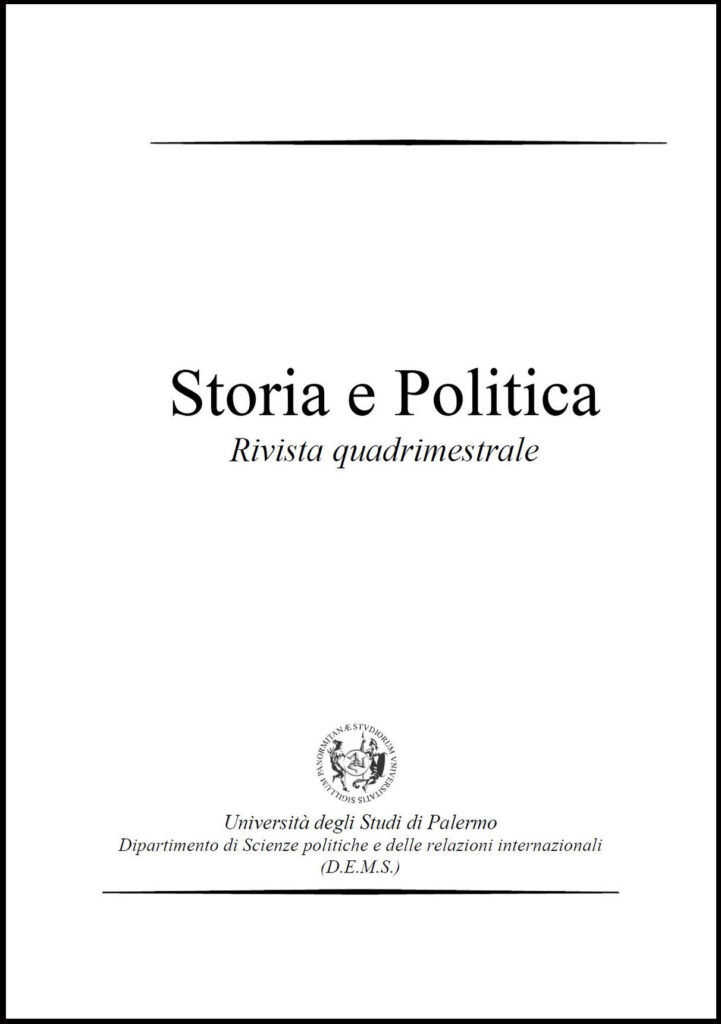Materia: Storia delle dottrine e delle istituzioni politiche
Rivista scaricabile gratuitamente fascicolo 1/2018
Storia e politica : rivista quadrimestrale : X, 1, 2018
Rosamaria Alibrandi
Università degli Studi di Messina
GUIZOT, CAVOUR E IL QUARANTOTTO. DUE VISIONI POLITICHE A CONFRONTO
(GUIZOT, CAVOUR AND 1848. A COMPARISON OF TWO POLITICAL VISION)
Keywords: François Guizot, Camillo Cavour, Cavourian Politics, The Idea of Nation, Italian Unity, Il Risorgimento (newspaper).
This paper examines the political relations between two great statesmen, which culminated in a political conflict at the beginning of the fateful year of 1848. Although Count Cavour had admired François Guizot in his youth, Cavour’s political mission was in contrast with French foreign policy. At the start of Cavour’s political career with the foundation of Il Risorgimento, he produced articles that harshly criticized Guizot’s political conduct with respect to Italy. Cavour’s absolute priority was to create a unified State, and it was essential that France be involved in the process. Despite this, Guizot gave no support to Piedmont. While the political career of Guizot descended to an unstoppable demise, Cavour’s ascended as he masterminded, and subsequently achieved, a diplomatic stroke of genius. This marked the opening of a personal and political gap that separated the pragmatic Piedmontese leader behind Italian unification and the influential French politician.
Massimo Nardini
Università degli Studi di Firenze
I PRESUPPOSTI DELLA SPEDIZIONE DI PISACANE E LA REALTÀ DEL REGNO BORBONICO
(THE ASSUMPTIONS OF PISACANE’S EXPEDITION AND THE REALITY OF THE BOURBON KINGDOM)
Keywords: Pisacane, Mazzini, Bourbon Kingdom.
The article, in the one hundred and sixtieth anniversary of the Pisacane expedition, reconstructs the historiographic problems inherent to it and the context in which it was planned, comparing the real situation of the Kingdom of the Two Sicilies with the conjectures of the conspirators concerning the feasibility of a popular uprising. The analysis highlights the distinction between the optimistic attitude of Pisacane and Mazzini, who designed the action from the outside, and of those who, residing permanently in the Bourbon territory, were forced to deal closely with the problems related to the lack of resources, both with those connected to the social question, which proved to be the concrete causes of the failure of Pisacane’s action.
Vito Varricchio
Università degli Studi del Sannio
IL PENSIERO COSTITUZIONALE ED ECONOMICO DI JOHN STUART MILL
(CONTITUTIONAL AND ECONOMIC THOUGHT OF JOHN STUART MILL)
Keywords: John Stuart Mill, liberalism, individualism, socialism, utilitarianism
This essay will describe and outline the aims of J.S. Mill’s work: to combine different doctrines and philosophical point of view. English Utilitarianism, German Romanticism and even Saint Simon Socialism: they all have their place in such intellectual effort. Mill tried to fuse liberalism, democracy and socialism. Through their contradictions and connections, Mill elaborated an original political and economic system based always on individual liberties, their role as limits to State power and to conformism.
Corrado Malandrino
Università del Piemonte Orientale “Amedeo Avogadro” – Alessandria
(ALBERTO CAPPA: A GOBETTIAN AUTHOR BETWEEN PARETO’S LIBERALISM AND THE ANALYSIS OF RISORGIMENTO AND FASCISM)
Keywords: Pareto’s liberalism, Italian Risorgimento, fascism, revolutionaries tendencies, social classes.
This article aims at reintroducing and examining in depth the liberal thought of Alberto Cappa, strongly influenced by Pareto. A forgotten author nowadays, in 1920s and 1930s he reached a certain celebrity since he published two books within the editorial series of Piero Gobetti and contributed to his journals. Cappa had a prominent role in the first generation of the scholars studying Cavour and the Italian Risorgimento. His book about Vilfredo Pareto was an interesting contribution to the Italian cultural and social history. From Missiroli Cappa drew the key interpretation of the Italian unification as the enlargement of Piedmont, due to Cavour’s political ability to absorb the revolutionary tendencies of his time. Furthermore, Cappa analysed the Fascist phenomenon by highlighting that its most relevant cause in the aftermath of Risorgimento was represented by the social and political dissatisfaction of the middle class, involved in a conflict against the new popular and socialist actors emerged during the age marked by Giovanni Giolitti.
Marcela P. Ferrari
Universidad Nacional de Mar del Plata – CONICET
RECREAR LA REPÚBLICA. CARLOS AUYERO Y EL PROCESO DE DEMOCRATIZACIÓN EN ARGENTINA
(RECREATE THE REPUBLIC. CARLOS AUYERO AND THE DEMOCRATIZATION’S PROCESS IN ARGENTINA)
Keywords: Argentina, Christian Democracy, Carlos Auyero, Political parties, Transition to democracy.
Achieving and consolidating democracy was the goal of the political actors that participated in the transitional process initiated in Argentina in 1982. Most of the projects presented in this regard were overshadowed by Raúl Alfonsín’s, especially those of the minority parties. That is why it is interesting to recover that of Carlos Auyero, leader of the Christian Democracy through the internal line Humanism and Liberation, identified as the progressive center-left of that party. In this paper, the main topics contained in his political speeches will be analyzed, specifically the so-called ’Recreate the Republic’. Located in the context of the dictatorial collapse and in the path of a humanist, the analysis allows to account for his commitment as a Christian Socialist, on the eve of democratic reconstruction. The work draws on written sources (memories, speeches, party press) and oral testimonies.
Umberto Gulli
Università degli Studi di Palermo
(TOWARD THE ROOTS OF THE REASONABLE. BEGINNING WITH RAWLS’TEACHING ON CATEGORICAL IMPERATIVE AT HARVARD)
Keywords: Rawls – Reasonable – original position – categorical imperative – Highest-order interests
Re-reading Rawls’ Introduction to the paperback edition of Political Liberalism for an understanding of the “kantian turn”. Difference between the “political conception of justice”and the pluralism of reasonable comprehensive doctrines. The relation between the criterion of reciprocity, reasonable (as intrinsic normative and moral ideal) and categorical imperative. This problem refers to the possibility of an interpretation of the original position in light of the reasonable. Primary goods and the “conception of free personality” as normative connotations of a constitutional democracy. Beginning with Rawls’teaching on categorical imperative in the Lectures at Harvard University.

